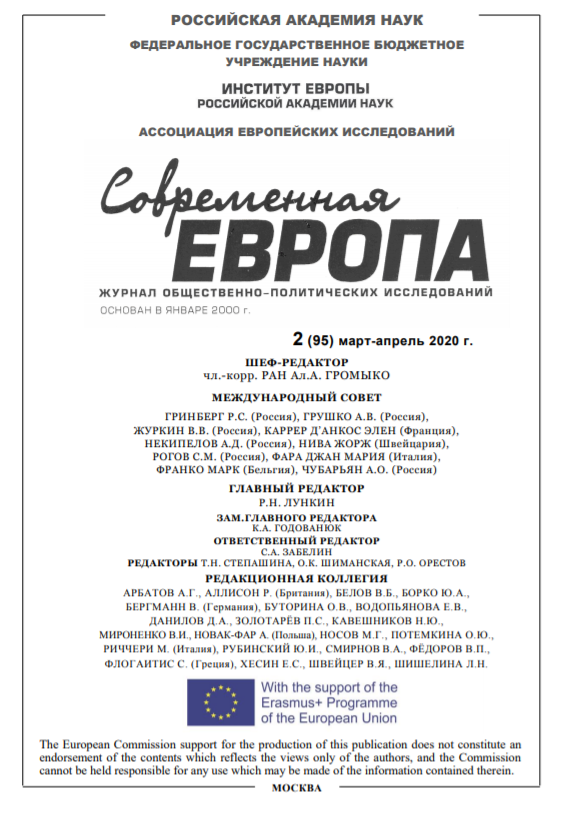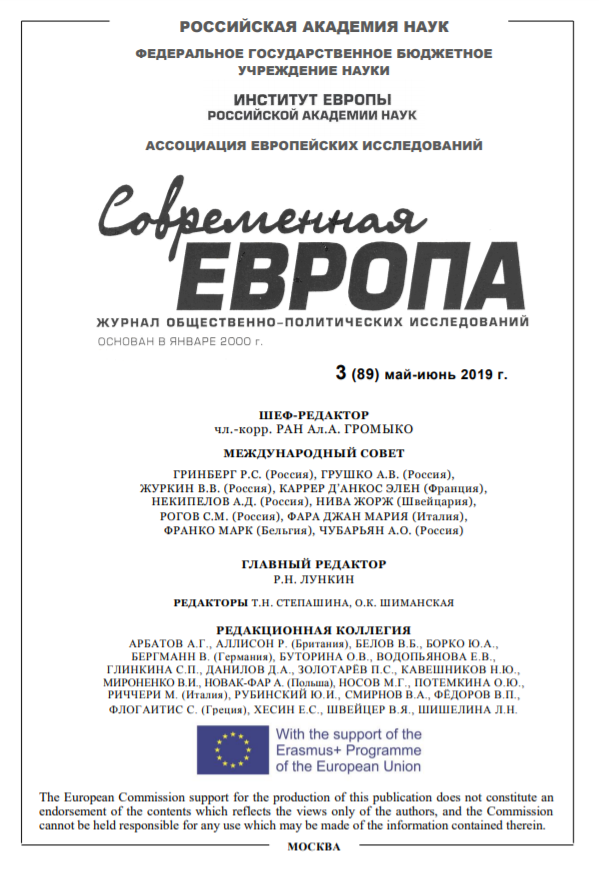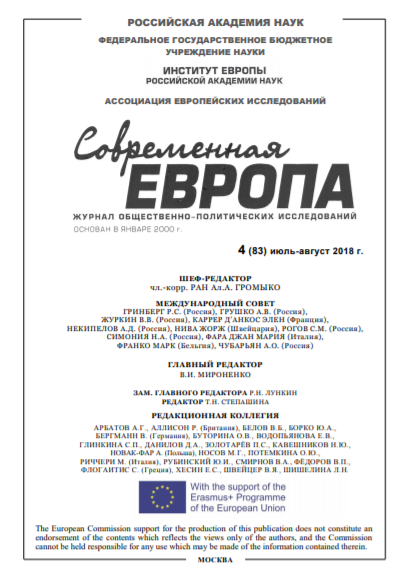Secial issues of “Contemporary Europe” journal
№ 2, 2020
The third EU focused special issue of Contemporary Europe journal (No. 2 (95), 2020) contains 12 original research articles on various topical aspects of European integration. This time they again split into two lager sections. The contributors to the first one highlight the current transformation of the European Union and the evolution of the European multilevel governance. The contributors to the second section explore the process of European integration through the lenses of country studies.
А conceptual issues of the EU integration capacity after Britain’s withdrawal is addressed in the paper by Olga Butorina, claiming that Brexit may give a powerful impetus to the integration through stronger competition between European democratic regimes and market economy models. Nikolai Kaveshnikov explores transformation of EU party-political space and the changing patterns of inter-parliamentary interaction in the European Parliament after 2019 EP elections. Olga Potemkina explores the overlapping competencies of various EU actors within the process of europeanisation of the EU migration policies after the reform envisaged by the Lisbon Treaty. Marianna Sokolova evaluates the first positive results of the new EU General Data Protection Regulation, which was adopted in April 2016 and became operational since 2018.
The country block opens with Ivan Timofeev's paper on US sanctions against EU companies and enterprises. Professor of the Estonian Business School Alari Purju shows how the switch to the single currency promoted economic growth in his country. Anna Cherverikova traces the evolution of investment ties between the Visegrad Group and Russia. Inna Andronova, Mila Minovska and Natalia Dyuzheva analyze the dynamics and structure of trade flows between the EU members and North Macedonia. Pavel Kandel reflects on the situation within the EU after France vetoed the start of accession negotiations with North Macedonia and Albania. Vyacheslav Sutyrin reveals the mechanisms of the growing EU humanitarian influence on the Eastern Partnership countries.
Printing costs for this issue are provided by the EU Jean Monnet Activities, Project No. 587105-EPP-1-2017-1-RU-EPPJMO-SUPPA «Strengthening European integration research and teaching in Russia».
№ 3, 2019
A second special EU focused issue of "Contemporary Europe" journal (No. 3 (89), 2019) contains 14 original research articles with a special emphasis on two highly relevant issues: the results of the recent elections to the European Parliament and on the state of EU-Russia’s relations, both political and economic.
The first block starts with a paper by Vladimir Shveitser who summarizes the most tangible results of the European Parliament activities in 2014–2019. Following him Tatyana Zonova analyzes positions of Euro-optimists and Euro-skeptics during the recent EP elections. Yuri Rubinsky and Alexei Sindeeev assess the impact of the elections on Franco-German political dialogue, playing a key role in the process of European integration. Ioannis Papageorgiou interprets a complex interaction between social and economic situation in Greece and the attitude of Greek voters to the EP elections. Pyotr Oskolkov scrutinizes the use of multiculturalism in right-wing and identitarian movements’ discourse against the background of their exploitation of a negative image of migration and a migrant as a constituting Other.
The article by Vladimir Ryzkov opens the block of papers on EU-Russia’s relations. The prominent politician and historian makes an effort to understand the roots of the current crisis and to find ways of rebuilding mutually beneficial cooperation. Tatiana Isachenko and Irina Medvedkova explore existing barriers and trade disputes in economic relations between Russia and the EU. Diana Ayvazyan and Elena Kuzmina identify EU interests in gas transmission projects in the Caspian-Black Sea region. Sergey Sutyrin and Irina Vorobyova sum up the experience of large Finnish companies operating in the Russian market. Natalya Kulikova and Irina Sinitsyna study the current state and dynamics of trade relations between Russia with its traditional partners in Central and Eastern Europe.
Furthermore, Alexander Shumilin focuses on the need of Europeans to elaborate an independent approach to the crisis situations in the Middle East, foremost with regard to Syria and Iran. Maria-Leena Vuorenpää explores the evolution of the Northern Dimension in EU politics and Finland's contribution to this process. The issue also contains articles by the winners of the 2018 AES junior scholars competition: Elizaveta Chinakova on the export of Russian natural gas to European countries and Timofey Novosad on EU decision-making mechanisms.
Printing costs for this issue are provided by the EU Jean Monnet Activities, Project No. 587105-EPP-1-2017-1-RU-EPPJMO-SUPPA «Strengthening European integration research and teaching in Russia».
№ 4, 2018
A special issue of Contemporary Europe (Sovremennaya Evropa), No. 4(83), 2018 explores various aspect of European integration and EU policies. The EU focused block includes ten original articles. Olga Potemkina examines positions of various political actors who will participate in 2019 European parliament election and their chances to appoint a president and members of the new European Commission. Vladislav Belov analyzes the European dimension of the new German government and its potential influence on the future of Greater Europe. Lyudmila Babynina tackles a very topical issue of EU-UK relations after Brexit. Vadim Voinikov examines the evolution of the EU visa policy. Olga Butorina and Anna Tsibulina explore the phenomenon of an uncommonly low inflation in the euro area. Vadim Tsirenshchikov summarizes approaches to the innovative development of the European economy. Marina Strezhneva addresses the problem of the democratic deficit in the EU Banking Union, while Cornelia Saling and Nikolai Gusakov evaluate its contribution to the financial stability. Roman Plyusnin examines the impact of EU membership on Finland's trade flows, and Marina Kolesnikova assesses economic effects of Brexit on Britain’s fishing industry.
Printing costs for this issue are provided by the EU Jean Monnet Activities, Project No. 587105-EPP-1-2017-1-RU-EPPJMO-SUPPA «Strengthening European integration research and teaching in Russia».







